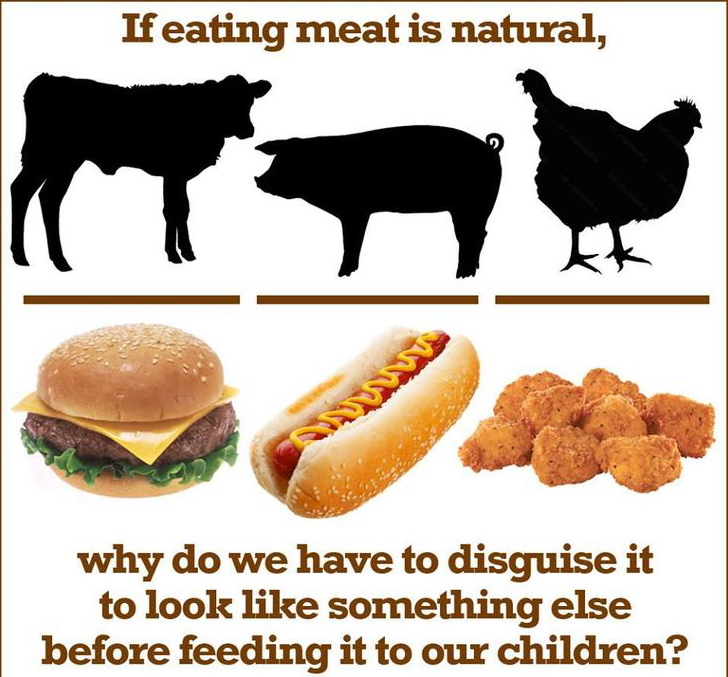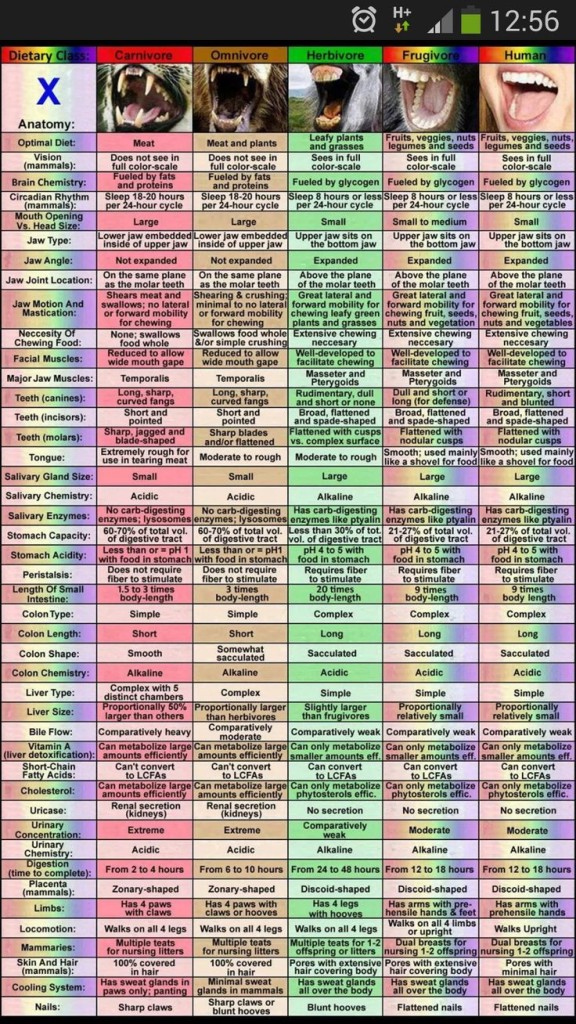Myth #74: “But humans are natural omnivores.”
Interestingly enough, of all the arguments I have heard by meat-eaters attempting to defend their consumption of flesh, this one seems to be by far the most common –- that somehow our mere ability to digest meat, along with the mere presence of “canines” in the human dental pattern, is enough to justify the imprisonment, abuse, murder and consumption of our sentient cousins. And yet once again, science simply does not support this myth …
Yes, over the millennia we humans have indeed developed the ability to eat animal flesh and consume animal secretions to survive in times of starvation, and yet the vast majority of our digestive physiology is clearly designed to consume plant material. This fact explains why meat-eaters live noticeably shorter lives than vegans, and also why meat-eaters & dairy-consumers suffer dramatically higher incidences of cancer, heart disease, diabetes, stroke and osteoporosis than humans who have adopted a plant-based diet instead.
And if the dramatic & documented health benefits of going vegan (see Myth #16 previously) are not proof enough that we humans are primarily plant-eaters by nature (“frugivores”, actually – mammals designed to almost exclusively eat a diverse array of fruits, vegetables, seeds & nuts), then the factual evidence of the physiological makeup of our bodies should do so. Indeed, when we compare the basic physical traits of humans to other animals, it becomes astoundingly clear that our bodies bear a remarkably close resemblance to herbivores – and are remarkably different from the bodies of most meat-oriented omnivores* and obligate carnivores … Consider the following small sample of these traits for your enlightenment:
Unlike carnivores & meat-oriented omnivores, human facial muscles are well-developed … Unlike carnivores & meat-oriented omnivores, human jaws have an expanded angle … Unlike carnivores & meat-oriented omnivores, human jaw joints are found above the plane of our molars … Unlike carnivores & meat-oriented omnivores, human jaws do not shear our food, but chew it with a side-to-side motion … Unlike carnivores & meat-oriented omnivores, humans’ primary jaw muscles are the masseter & the pterygoids … Unlike carnivores & meat-oriented omnivores, human mouth openings are small compared to our head size … Unlike carnivores & meat-oriented omnivores, human incisors are broad, flattened & spade-shaped … Unlike carnivores & meat-oriented omnivores, human canines are short & blunted … Unlike carnivores & meat-oriented omnivores, human molars are flattened with cusps … Unlike carnivores & meat-oriented omnivores, humans must first chew their food to digest it properly … Unlike carnivores & meat-oriented omnivores, human saliva contains carbohydrate-digesting enzymes … Unlike carnivores & meat-oriented omnivores, human stomach-acidity has a pH level of 4 to 5 when food is present … Unlike carnivores & meat-oriented omnivores, human stomachs have a capacity that is less than 30% of their entire digestive tract … Unlike carnivores & meat-oriented omnivores, human small intestines are over 10 times their body length … Unlike carnivores & meat-oriented omnivores, human colons are long & sacculated … Unlike carnivores & meat-oriented omnivores, human livers cannot detoxify Vitamin A … Unlike carnivores & meat-oriented omnivores, human kidneys produce moderately concentrated urine … Unlike carnivores & meat-oriented omnivores, humans have flattened nails instead of claws.
The list actually continues on, and yet the point has been clearly made clearly enough: we humans — despite possessing the ability to consume small amounts of the flesh &/or the secretions from other animals when forced to do so — are plant-eaters by nature.
Some people also argue that since chimpanzees (our closet animal relatives) eat meat, we humans should as well. And yet here once again, the science tends to say otherwise. In a recent Harvard University study (researched by Conklin-Brittain, Wrangham & Smith), meat consumption of the primates studied was so rare it was documented in the data under the title “miscellaneous” (not even as “meat”). The study noted that chimps obtained less than 1% of their calories from non-plant sources (and these mostly via the consumption of insects – primarily termites) … To put that into perspective for us humans, after rounding the Harvard figure up to a generous 1%, the average chimpanzee insect consumption would equate to roughly 8 grams of meat a day — about the size of a cube of sugar. That’s right, if you truly desire to accurately mimic the “omnivorous” diets of our closest primate relatives (which I personally do not recommend – as a pure vegan diet is both much tastier & much healthier for humans), then you would be limited to one tiny fingertip of meat a day.
Of course, when it comes to ethical decisions as important as what foods we choose to put on our plates, do we really want to play “monkey see, monkey do” … … with monkeys?
“Eating meat is indeed absolutely natural [in the animal kingdom]. However, the fact that it is natural does not imply that it is ethically acceptable. If we believed that eating meat was ethically permissible simply because other animals did it as well, then this would imply that there is nothing wrong with rape, cannibalism, or infanticide, all of which routinely occur there.” ~ Eugene Khutoryansky
Indeed, if we humans are made to eat meat, why must we cook it to consume it safely, thereafter cut it into small pieces to keep from choking on it, and chew it thoroughly to be able to even partially digest it (all problems unknown to true carnivores & meat-oriented omnivores)? … Indeed, if we humans are made to eat meat, why do we instinctively react with sorrow when we see an injured animal, and disgust when we see a dead one? … Indeed, if we humans are made to eat meat, why is that anyone choosing to kill an animal with his or her bare hands and then eat its corpse raw is rightfully considered “despicable” or “deviant”, if not downright “deranged”? … Indeed, if we humans are made to eat meat, why are the vast majority of us not aroused by the scent of blood – and why are the vast majority of us disgusted by the sight of raw flesh and revolted by the screams of animals being ripped apart and murdered? … In deed, if we humans are made to eat meat, why do we adore the animals our cultures deem to be “pets”, and severely condemn and sternly punish all the “criminals” who inflict pain & suffering upon them?
In case you are at a loss as to how to respond to these very important questions, allow me to provide you with more than a mere hint — We engage such practices (and experience such reactions, and suffer such feelings, and make such judgments) for one, simple reason: We humans are simply not designed to eat meat.
Finally, and most importantly of all, even if we humans were natural meat-oriented omnivores, a plant-based diet has still been proven to be a thoroughly healthy & completely cruelty-free alternative for all humans … As such, since we do not need to cause other sentient species to suffer & die in order to live a long (actually longer) & healthy (actually healthier) life, why shouldn’t we do so? After all, it really doesn’t matter what we have eaten in the past or what we can eat today… It only matters that we now know better — and that we can therefore eat accordingly.
Current status of this Myth: Decontaminated
Justification it provides for eating animals: NONE
“We are born with a strong natural aversion to violence and blood; to the act of preying on another animal. We possess the ability to feel our fellow animals’ pain & fear as if it were our own, and to choose to use this empathy to guide our judgment. The shackles and weapons we have devised may allow us to distance ourselves from the cruel reality of capturing, imprisoning, and killing our fellow animal. But they cannot shield us from the truth that is in our hearts.” ~ Alisa Rutherford-Fortunati
“Human beings have the gastrointestinal tract structure of a “committed” herbivore, and do not show the mixed structural features one expects and finds in anatomical omnivores such as bears and raccoon. Thus, from comparing the gastrointestinal tract of humans to that of carnivores, herbivores, and omnivores, we must conclude that humankind’s GI tract is designed for a purely plant-food diet.” ~ Dr. Milton Mills
“Stepping away from animal exploitation, I was able to heighten my perspective enough to see through the greatest conspiracy of all; the conspiracy that has convinced the whole human race that they are predatory animals, fashioned to hunt and kill prey and consume their body parts; a conspiracy that has persuaded an unknowing and trusting public that they have the right to sacrifice the lives of other sentient beings for their pleasure, comfort and convenience; a conspiracy that has cost humans their physical and spiritual health, the earth its precious natural resources, and caused the animal kingdom untold suffering via the cruel termination of billions upon billions of their innocent lives.” ~ anonymous
*NOTE: There is actually no such thing as a “standard omnivore” … What there IS is a wide-ranging gradient of omnivorous species, many of which having much of their GI tract resembling that of carnivores (wolverines – who eat primarily other animals, possums & badgers – who eat primarily insects &/or earthworms, raccoons – who obtain roughly two-thirds of their calories from eating other animals, dogs & bears & chickens – who eat whatever is available, and maned wolves – who split their animal & plant-based calories 50/50). Then there are omnivores whose GI tracts start to more closely resemble their herbivorous cousins (pigs – who get the majority of their calories from plants, and squirrels & chipmunks – who obtain roughly 85% of their caloric intake from plant sources). Finally, at the far end of the spectrum, we have the “frugivores” – chimps and bonobos and gorillas and orangutans … and humans; animals who naturally obtain over 99% of their caloric intake from plant-based sources) Yes, we humans are an unusual species, as we do have very few carnivorous digestive traits (hydrochloric acid in our stomachs being one of them), many dozens of traits common to herbivores, and a few traits that are common to neither. Thus, our relatively unique classification as “frugivores” is quite accurate indeed.








 ;
;